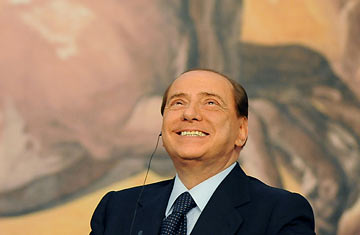
Italian Prime Minister Silvio Berlusconi at Villa Madama in Rome
The world has spent the past six months wondering how — and with whom — Silvio Berlusconi spends his Saturday nights. But the combative, scandal-plagued Prime Minister of Italy would prefer to talk about his mornings instead. "Do you know how I've been forced to spend my Saturday mornings since I entered politics?" Berlusconi once declared to business leaders in Rome. "With my lawyers."
Italy's self-proclaimed Defendant in Chief makes a point of lamenting all those weekends spoiled by stacks of court dossiers as further proof that he is the victim of politically motivated magistrates, whom he called during the same speech "the spreading cancer of our democracy."
To combat such perceived persecution, Berlusconi has tested the bounds of decorous democratic conduct, including his allies' pushing a bill through Parliament last year that gave him and other top Italian officeholders immunity from prosecution. But since the Constitutional Court overturned that law in October, several criminal investigations into Berlusconi's business dealings have been reopened, with other new charges rumored to be looming.
The potentially most damaging trial is set to resume Friday, Dec. 4, in Milan, with the 73-year-old billionaire being accused of paying British attorney David Mills $600,000 in 1997 to withhold incriminating evidence about his broadcasting empire Mediaset. Mills is appealing a conviction in the same case; both men have denied any wrongdoing.
So, alas, Berlusconi is back to spending his downtime with a well-paid cadre of more than a dozen avvocati, who have been successful so far in keeping their biggest client clear of criminal convictions. Not that the lawyers have ever really gone away. Since the media baron first ran for office 15 years ago, his legal advisers have doubled as political consiglieri, key members of Parliament and even important Cabinet Ministers. Indeed, while some critics have spoken of Berlusconi's reign as a kind of sultanate of showgirls or government by gaffe, others have described it as a republic of attorneys.
His longtime lawyer Cesare Previti served as Italian Defense Minister during Berlusconi's first term in 1994 before being convicted of corruption himself (and losing twice on appeal). During Berlusconi's second term (2001-06), Gaetano Pecorella, a former leftist, served as president of Parliament's Justice Commission, where he was instrumental in shepherding through new laws that helped shield Berlusconi from investigating magistrates.
Giovanni Sartori, a Columbia University professor of constitutional law, says the role Berlusconi's personal lawyers have played in his legislative agenda is yet another gargantuan conflict of interest to add to those related to his ownership of Italy's main private television stations. But by now, Sartori says, Berlusconi's lawyers have perfected the art of exploiting Italy's painfully slow justice system: many cases conclude without a final verdict because the statute of limitations has been reached. "It is more a mania than a necessity," Sartori says of Berlusconi's near obsession in battling magistrates. "He feels persecuted, and fighting the judges is what makes him happy."
Berlusconi's current point man is Nicolo Ghedini, a somber-faced, lanky 49-year-old criminal-defense attorney from the northern city of Padua, who has served in both the Italian Senate and the lower house of Parliament. Ghedini has continued to mount a grinding defense in the criminal cases, arguing in the Mills case that Berlusconi cannot be present in the Milan courtroom for the next several months because of time conflicts with his duties as Prime Minister. Ghedini has also spearheaded an increasingly aggressive legal strategy that has included several libel suits against opposition newspapers. He declared in September that if necessary, Berlusconi would testify in a suit against a journalist who referred to rumors that the Prime Minister is impotent. Last week, Berlusconi vowed to launch additional suits against newspapers that printed unsubstantiated reports that a close adviser of his was involved in a 1993 bombing campaign by the Sicilian Mafia.
Despite these many legal headaches, Berlusconi is embroiled in one other particularly thorny case that even he can't blame on overzealous magistrates. Veronica Lario, Berlusconi's wife of more than 20 years, filed for divorce earlier this year, which sparked an avalanche of accusations that he frequented a prostitute from Bari and an underage model from Naples. The Milan daily Corriere della Sera reported last week that Lario has demanded 3.5 million euros ($5.2 million) in monthly payments, and Berlusconi countered with an offer of 300,000 euros ($450,000). No matter how this and the other cases shake out, there is little hope that Berlusconi can avoid a mountain of lawyers' fees and some grim Saturdays that he'd rather devote to other business and pleasures.
